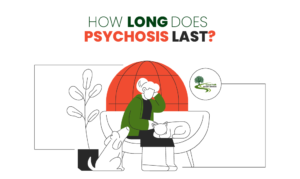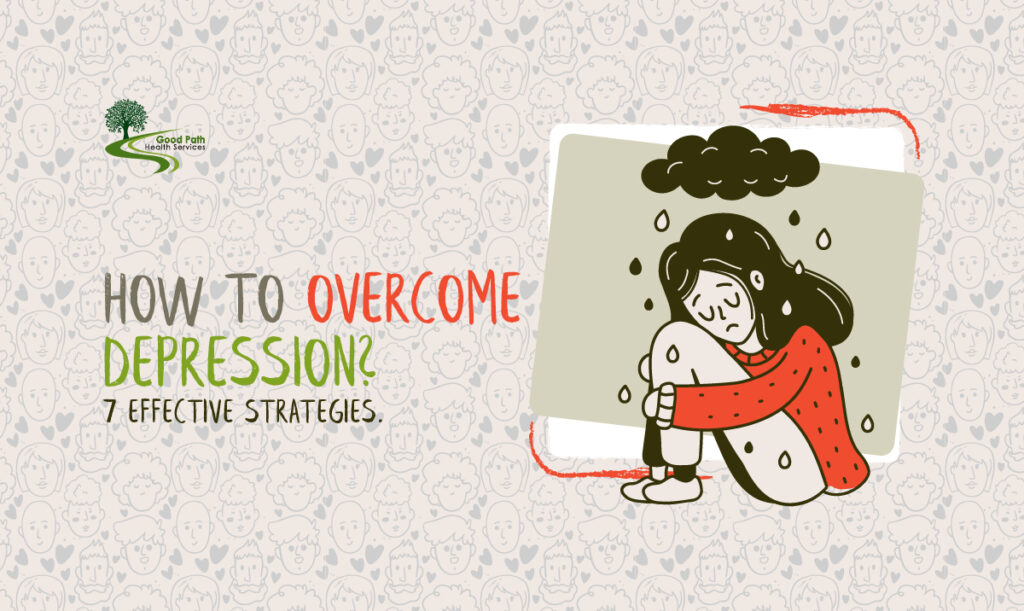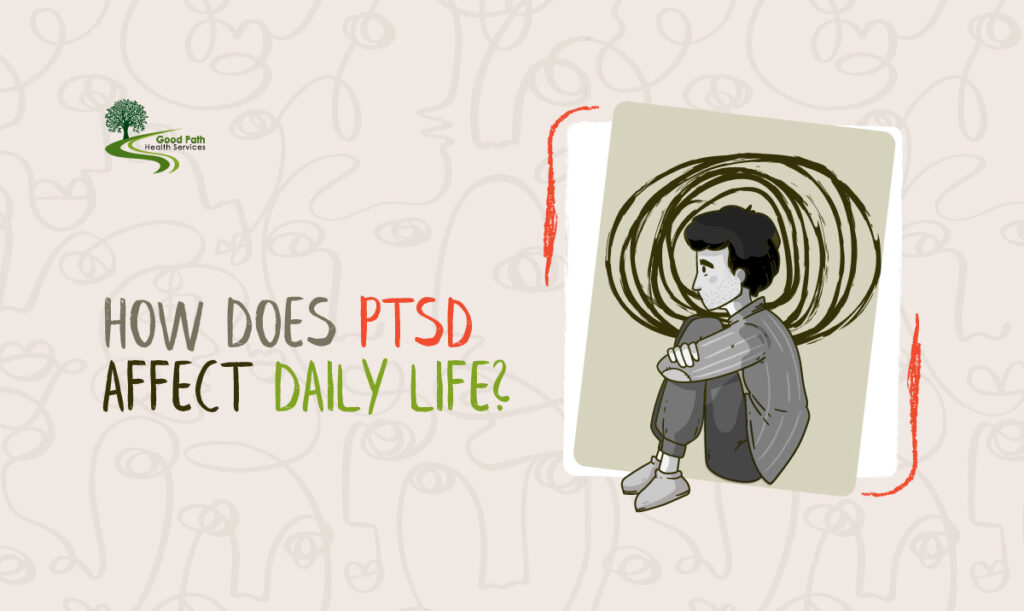
Psychosis is a deeply disorienting mental state that can be a distortion of reality, affecting not only the person experiencing it but also their loved ones.
There can be some underlying conditions that might cause it.
Being aware of the duration of psychosis is essential to providing the proper care, setting expectations, and managing the recovery process.
Join us as we talk about the details of psychotic episodes from their onset to recovery.
What is Psychosis?
Before we grasp the timeline of psychosis it’s essential to understand the condition itself.
Psychosis can be a symptom of several mental health disorders, including:
- Schizophrenia.
- Bipolar disorder.
- Severe depression.
- Outside factors like drug abuse, extreme stress, or physical illness can also cause it.
Hallucinations are the main symptoms of psychosis — which can affect any of the five senses and delusions — which can be complicated and have different themes.
Sometimes people who experience psychosis might not perceive their experience as abnormal which can complicate treatment and recovery.
Symptoms of Psychosis
- Hallucinations. Seeing or hearing things that aren’t there
- Delusions. False solid beliefs, usually paranoid or grandiose that are defiant to logic.
- Disorganized thinking. Jumping between unrelated topics or making a rambling speech.
- Lack of insight and self-care. Trouble recognizing the need for treatment or managing daily tasks
The question of ‘how long does psychosis last’ varies hugely from person to person and we’ll explore that in detail next.
How Long Does Psychosis Last? – Duration of Psychosis
There are two general subcategories when discussing the duration of psychosis: acute and chronic.
1. Acute Psychosis
Acute psychosis has a sudden and severe onset of symptoms.
It can surely be a terrifying experience for the person and the people around them.
An acute psychotic episode can last for hours, days, or even weeks.
The severity of the episode and the person’s underlying mental health condition is something to look into when assessing the duration of acute psychosis.
2. Chronic Psychosis
Chronic psychosis refers to an extended and prolonged episode.
It doesn’t have a clear beginning or end and the line between the ‘episode’ and the person’s baseline functioning can become blurred.
In conditions like schizophrenia, chronic psychosis can become a recurrent part of the person’s life with periods of more intense symptoms interspersed with relative calm.
Reasons Influencing Duration
Several things can affect how long psychosis lasts:
- Underlying Diagnosis. Different conditions have different courses.
- Severity of Symptoms. More severe symptoms might take longer to subside.
- Compliance with Treatment. Regular treatment can shorten the duration of an episode.
- Environmental Factors. A supportive or stressful environment can affect the recovery process.
Timelines for Recovery
In general a first episode of psychosis can take several weeks to resolve, especially if left untreated.
Living with chronic conditions means managing symptoms and flare-ups on an ongoing basis.
With the proper support and treatment most people can return to health or at least find effective ways to manage their symptoms.
It’s essential to understand that even as we explore these general timelines, each person’s experience is different, and some might find relief more quickly or experience a slower recovery.
Effects on Patients and Caregivers
The effects of psychosis extend beyond those experiencing the symptoms; caregivers and families are often affected as well.
1. Effects on Routine
During an episode of psychosis, an individual’s ability to function in daily life can be severely compromised.
This may mean difficulty maintaining work or school responsibilities, struggling with personal relationships, and a decline in self-care.
2. Emotional Toll on Patients and Caregivers
The fear, confusion, and helplessness that can come with witnessing a loved one in psychosis are enormous.
For the person experiencing psychosis the emotional toll can be equally heavy, with feelings of isolation and fear that can persist even after the symptoms have gone away.
3. Coping Strategies During and After Psychosis
Finding effective coping strategies is critical for both patients and caregivers,
This includes:
- Making a routine.
- Seeking support from mental health professionals and education about the condition.
- After an episode, continuing with treatment plans can help manage the risk of psychosis relapse and keep the person stable.
Getting Help and Support
One of the most essential steps in managing psychosis is finding help and support.
This can affect how long the symptoms persist and the person’s long-term health.
1. Importance of Early Treatment
Getting early help and treatment can help reduce the severity and duration of symptoms of psychosis.
Recognizing the signs of psychosis and seeking help as soon as possible is essential for a positive outcome.
2. Available Treatment Options
Treatment for psychosis involves a combination of:
- Medications.
- Therapy.
- Support services.
Antipsychotic medications can be beneficial in reducing symptoms.
Psychological therapies like cognitive-behavioral therapy (CBT) and supportive counseling can help patients understand and manage their symptoms.
Good Path Health Services provides help in times of need — visit us for psychosis treatment and care.
3. Support Resources for People and Caregivers
Support groups, educational resources, and community services are essential for patients and caregivers dealing with psychosis.
Connecting with others who have similar experiences can provide a supportive environment for learning and growth.
For helpful resources and hotlines, please visit our community resources page.
For more information regarding psychosis; consider visiting the National Institute of Mental Health.
In Closing
We’ve explored the duration of psychosis; it’s essential to be aware that every person’s experience is different.
What remains consistent is the need for patience, understanding, and thorough support.
Through seeking help, learning about the condition, and ensuring a supportive environment, patients and their caregivers can manage the symptoms of psychosis.
Timely help and care are available at Good Path Health Services; please reach out for assistance.
FAQs
What is late onset psychosis?
Late-onset psychosis refers to the development of psychotic symptoms for the first time in individuals typically over the age of 40.
Psychosis in elederly requires careful medical assessment to differentiate from other conditions that can occur in later life.
Can suboxone cause psychosis?
Rare instances of psychosis have been reported in patients using buprenorphine medications like Suboxone according to a case report published in the NCBI.
What is the first episode psychosis in old age?
First-episode psychosis in old age is the occurrence of psychotic symptoms for the first time in people who are 60 and above.
It usually needs a thorough evaluation to understand its causes and best treatment approaches.
Is psychosis a disability?
Yes, psychosis can be considered a disability if it seriously limits one or more major life activities — including working.
This classification helps people access support and accommodations.
What is cocaine psychosis?
Cocaine psychosis is when the use of cocaine leads to psychotic symptoms like hallucinations and paranoid delusions.
These symptoms resolve once the drug use stops.
How do I get a mental psychosis test?
A mental psychosis test involves a clinical assessment conducted by a mental health professional including:
- Interviews
- Questionnaires
- Sometimes physical examinations to rule out other causes.
What is the psychosis spectrum test?
The psychosis spectrum test is a diagnostic tool used by clinicians to assess the range of psychotic disorders a person might be experiencing. It’s based on their symptoms and history.
What is affective psychosis?
Affective psychosis is a type of psychosis where symptoms mainly involve mood disturbances like major depression or bipolar disorder with psychotic features.
Can one experience suicidal psychosis?
Yes, people experiencing psychosis can have thoughts of suicide especially without the right treatment and support. It’s important to get timely support and care.
How are suicide and psychosis related?
There is a noteworthy relationship between suicide and psychosis as people with untreated psychosis have a higher probability of considering or attempting suicide.
It’s important to find prompt care and support.
Can OCD with psychosis coexist?
Yes, OCD can coexist with psychotic symptoms — though it’s rare and the two conditions can influence each other’s treatment and management.
How do you differentiate between psychosis or panic attack?
Both conditions can present with intense fear or discomfort.
Psychosis involves a break from reality such as hallucinations or delusions. Panic attacks are mainly episodes of fear or anxiety without loss of reality.
What does a psychosis therapist do?
A psychosis therapist specializes in providing therapy for people experiencing psychosis.
They provide techniques to:
- Manage symptoms.
- Address underlying issues.
- Improve your overall health.
Can gaslighting cause psychosis?
Chronic gaslighting, due to its psychologically manipulative nature, can cause mental distress and even aggravate or precipitate symptoms in those at risk for psychosis — though it’s not a direct cause.
Can supplements cause psychosis?
Yes specific supplements, especially when taken in excessive amounts or in combination with other substances, induce psychotic symptoms.
How long does alcohol psychosis last?
Alcohol psychosis lasts from a few hours to a few days after heavy alcohol consumption stops.
Do people with psychosis usually come from dysfunctional families?
Psychosis has different causes like genetic, biological, and environmental factors.
Dysfunctional family dynamics can be a stressor but are not the sole cause of psychosis.



